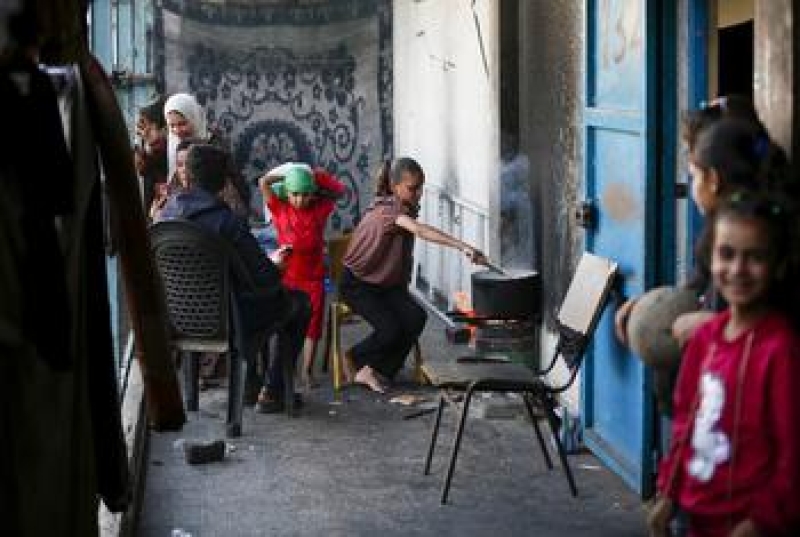- Puppet show enchants Children as Boi Mela comes alive on day 2 |
- DSCC Admin Salam’s drive to make South Dhaka a ‘clean city’ |
- 274 Taliban Dead, 55 Pakistan Troops Killed |
- Now 'open war' with Afghanistan after latest strikes |
- Dhaka's air quality fourth worst in world on Friday morning |
Gaza: Desperate Search for Food Turns Deadly, Says UN

Palestinians shelter in an UNRWA school in central Gaza
The worsening humanitarian crisis in the Gaza Strip has reached “unprecedented levels of despair,” the UN said on Monday, amid more reports of people being killed and injured near newly established distribution sites.
Since the end of May, aid distribution in Gaza has been carried out by a mechanism backed by Israel and the United States, bypassing UN agencies and their established partners. This system has been plagued by deadly incidents and chaos.
On Monday, UN partner the International Committee of the Red Cross (ICRC) reported that 29 casualties arrived at its field hospital in western Rafah that morning, eight of whom had died.
Almost all had explosive trauma wounds, with two others suffering gunshot wounds.
Forced to choose
“The UN reiterates that civilians must always be protected,” said Deputy Spokesperson Farhan Haq, speaking from Headquarters in New York.
“No person, anywhere, should be forced to choose between risking one’s life and feeding one’s family.”
Fuelling aid efforts
Meanwhile, fuel stocks in Gaza are dangerously low, putting further strain on critical services and humanitarian operations.
Mr. Haq said that some 260,000 litres of fuel were looted in northern Gaza over the weekend.
Prior to this, the UN had repeatedly tried to reach these stocks to retrieve them, but Israeli authorities denied these attempts—14 denials since 15 May.
“Our attempts to reach fuel supplies in Rafah, in the south of Gaza, also continue to be denied,” he added.
“The UN warns that unless a solution is found in the coming days, the entire aid operation could come to a standstill.”
‘Desperate, starving people’
Mr. Haq also updated on efforts to bring desperately needed humanitarian assistance into the Gaza Strip, where the entire population—more than two million people—faces famine conditions.
On Monday, the UN led a mission to deliver supplies that entered the enclave via the Kerem Shalom border crossing to Gaza City, which was still ongoing.
Since Israel allowed limited amounts of aid to enter on 19 May, the UN and partners have only been able to collect about 4,600 metric tonnes of wheat flour from Kerem Shalom.
“Most of it was taken by desperate, starving people before the supplies reached their destinations. In some cases, the supplies were looted by armed gangs,” he said.
Resume aid flow now
Mr. Haq emphasized that, as the occupying power, Israel bears responsibility for public order and safety in Gaza.
“That should include letting in far more essential supplies, through multiple crossings and routes, to meet humanitarian needs and help reduce looting,” he said.
UN partners working on food security estimate that between 8,000 and 10,000 metric tonnes of wheat flour are required to reach all families across Gaza with at least a single bag.
He stressed that “the sustained and unrestricted flow of aid into Gaza must resume as soon as possible.”
Dangerous routes, driver shortages, and delays
He said no missions to collect supplies from Kerem Shalom took place over the weekend, as Israel informed that the crossing would remain closed on Friday and Saturday.
Humanitarians also continue to face major impediments affecting their ability to conduct these operations, including unacceptably dangerous routes, a severe shortage of vetted drivers, and delays.
West Bank update
Mr. Haq also touched on the situation in the occupied West Bank.
He said operations by Israeli forces in the north have continued over the past week, destroying roads and disrupting Palestinians’ access to essential services.
The UN and partners continue to respond, including by providing water, sanitation, and hygiene assistance to tens of thousands of displaced Palestinians.

